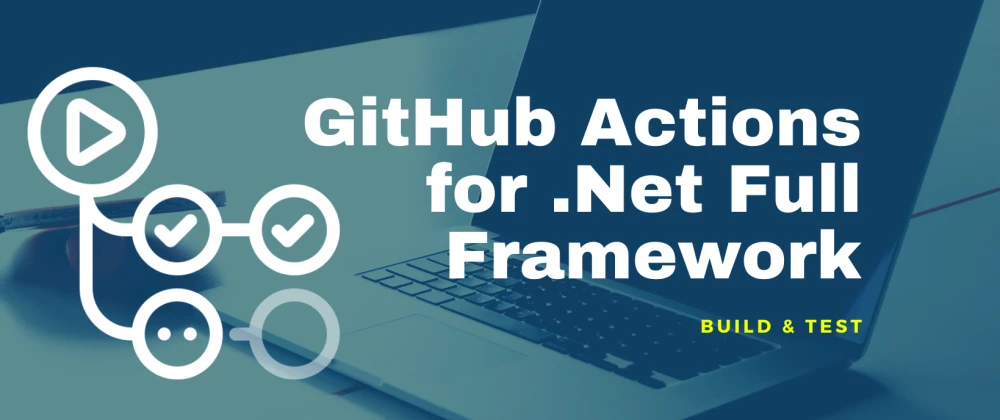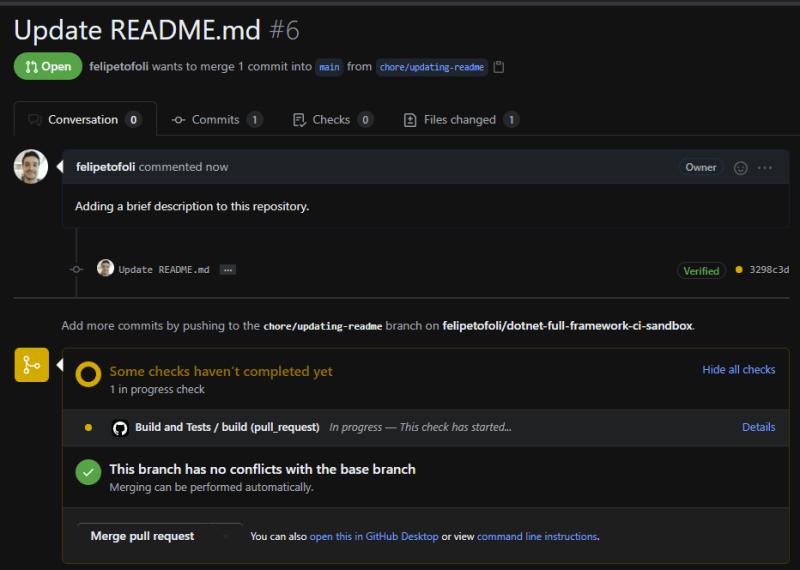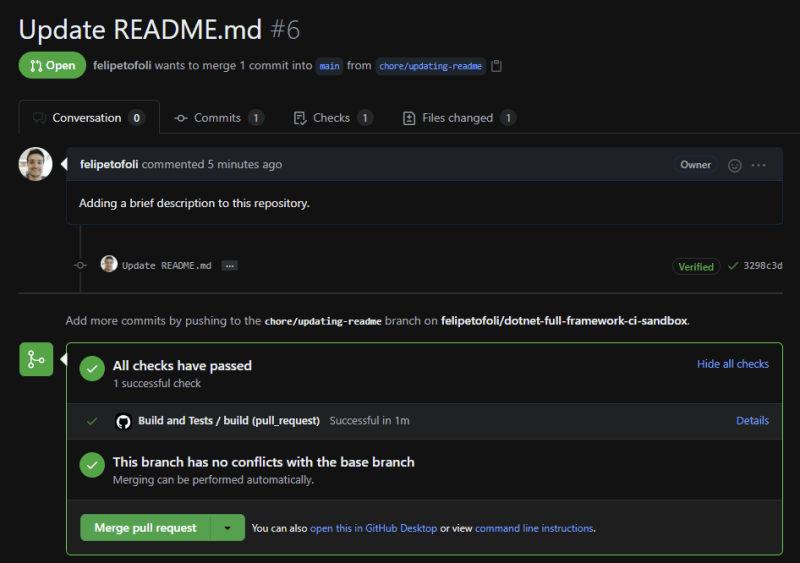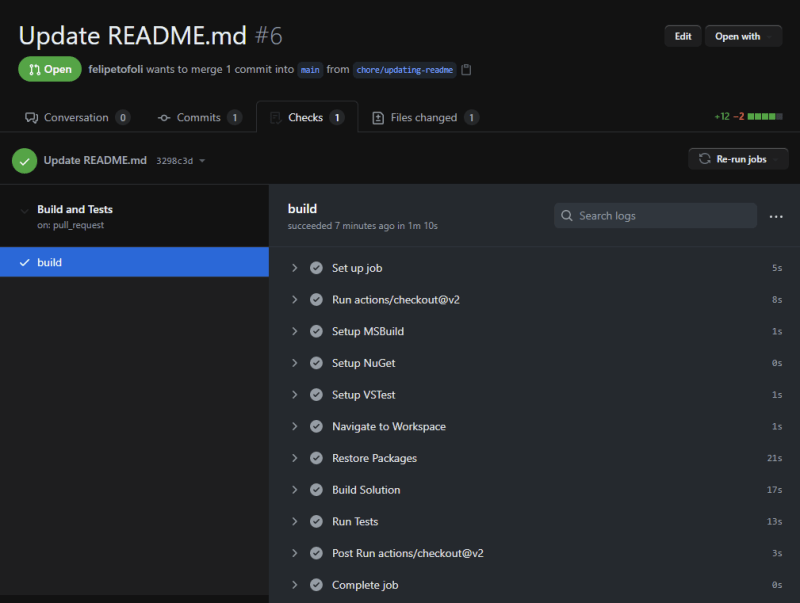GitHub Actions for .Net Full Framework: Build and Test
Originally posted here: dev.to account.

Can we create GitHub Actions to Build and Test .Net Full Framework projects?
![]() YES, we can! And I will show you how I did it.
YES, we can! And I will show you how I did it.
But first, let me give you some context 
I recently had to deal with a legacy code base of a .Net Full Framework project.
The source code was versioned on GitHub and there was a pull request and code review flow for integrating source code into the main branch. However, there were no checks to verify the code that was being integrated, which would allow source code that did not compile, or that broke unit tests, to be included in our main branch without any alerts.
The absence of quick feedback on the health of the integrated source code created some sense of insecurity in the developers during the approval of the pull requests, since problems inserted through the addition of new code could take much longer than desired to be identified.
In order to improve our workflow, I thought about creating a CI workflow with GitHub Actions to speed up the flow of feedback during our source code integrations.
When checking the documentation of GitHub Actions, I realized that there was no template for creating a workflow for .Net Full Framework projects. And then I asked the same question at the beginning of this text:
Can we create GitHub Actions to Build and Test .Net Full Framework projects?
Throughout my research journey, I discovered some resources, both official and from the community:
The use of the above actions allowed me to create the CI pipeline for my .Net Full Framework project. I configured the CI pipeline to be triggered by each new push or pull request in the main branch, as shown in the ci.yml file below:
Understanding the created action
Below, step-by-step explanation of the ci.yml file:
- Define the name of the GitHub Action.
name: Build and Tests - Set that the actions should be triggered by
pushand creation ofpull requestsfor the branchmain(default branch of this project).on: push: branches: [ main ] pull_request: branches: [ main ] - The build and test will be performed on a Windows operating system, because we are dealing with .Net Full Framework (which does not support other operating systems).
jobs: build: runs-on: windows-latest - Define the section that will group all the steps performed, detailed in the next items.
steps: - Checkout the code.
- uses: actions/checkout@v2 - MSBuild setup, for later use.
- name: Setup MSBuild uses: microsoft/setup-msbuild@v1 - Nuget setup, for later use.
- name: Setup NuGet uses: NuGet/setup-nuget@v1.0.5 - VSTest setup, for later use.
- name: Setup VSTest uses: darenm/Setup-VSTest@v1 - Navigate to the GitHub workspace to start the restore, build and test of the application.
- name: Navigate to Workspace run: cd $GITHUB_WORKSPACE - Use
nugetto restore packages used by the application.- name: Restore Packages run: nuget restore Sandbox.sln - Build the solution with
msbuild.exe, release mode.- name: Build Solution run: | msbuild.exe Sandbox.sln /p:platform="Any CPU" /p:configuration="Release" - Run the tests of the
Sandbox.Tests.dll, usingvstest.console.exe.- name: Run Tests run: vstest.console.exe .\tests\Sandbox.Tests\bin\Release\Sandbox.Tests.dll
Results
After we implanted our CI pipeline, just open a pull request too see the result of our implementation.
Opened PR, actions pending execution
When opening a pull request, we can now see that some checks are pending execution.

Opened PR, actions performed
After the execution of our checks, the result is already shown on the PR page. Now that the checks are ok, the Merge pull request button is highlighted.

Details of actions performed
When analyzing the checks tab, we can verify the execution step-by-step. If there was any failure, on this page it would be possible to check which step was broken and analyze the logs to identify the error.

If you got curious to browse a page with details of the actions’ executions, here you can find a successful execution, and here you find a failed execution.
The project
Are you curious about the project? This is the repository where all the source code is available:
Please, consider leaving a ![]() in the repository it it helps you!
in the repository it it helps you! ![]()
Conclusion 
Dealing with legacy code can be very complicated, so proposing workflow improvements can help us dramatically change the reality of the project, by encouraging quick feedback and mitigating points of insecurity that harm the development team.
GitHub Actions are very useful tools for automating CI processes. Although it does not contain an initial template in the official documentation, it is possible to create workflows with GitHub Actions for .Net Full Framework, thanks to the official actions and also those created and made available by the community.
I had some work to get my CI pipeline viable, if you have any problems in the implementation of yours and want to share in the comments of this post, I will be happy to help you.
Bye! ![]()
![]()
…
![]() It is worth remembering that, before using the workflow, it is important to check if it and its dependencies are in accordance with the project policies where you want to apply them.
It is worth remembering that, before using the workflow, it is important to check if it and its dependencies are in accordance with the project policies where you want to apply them. ![]()